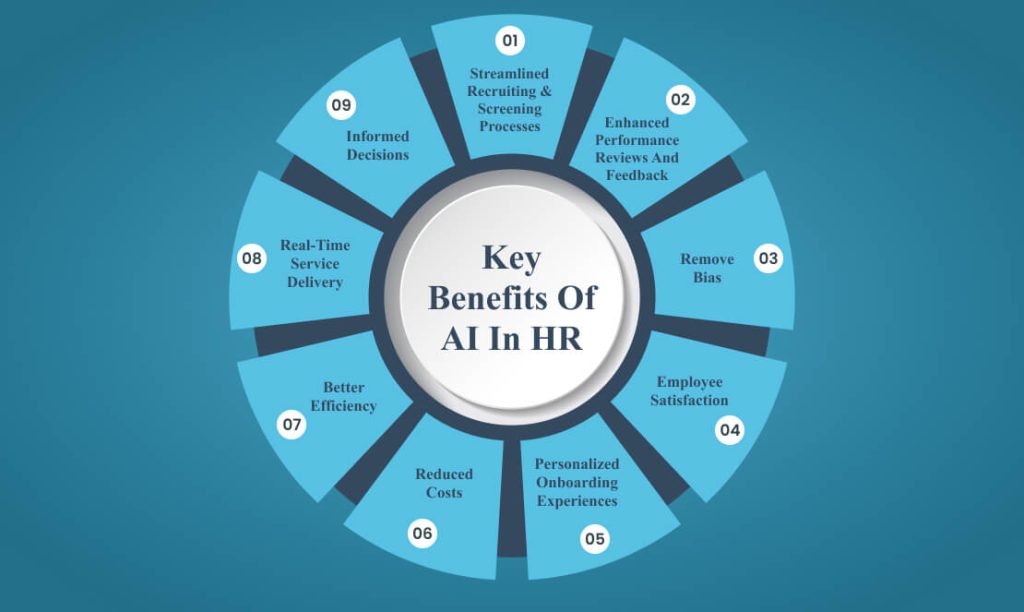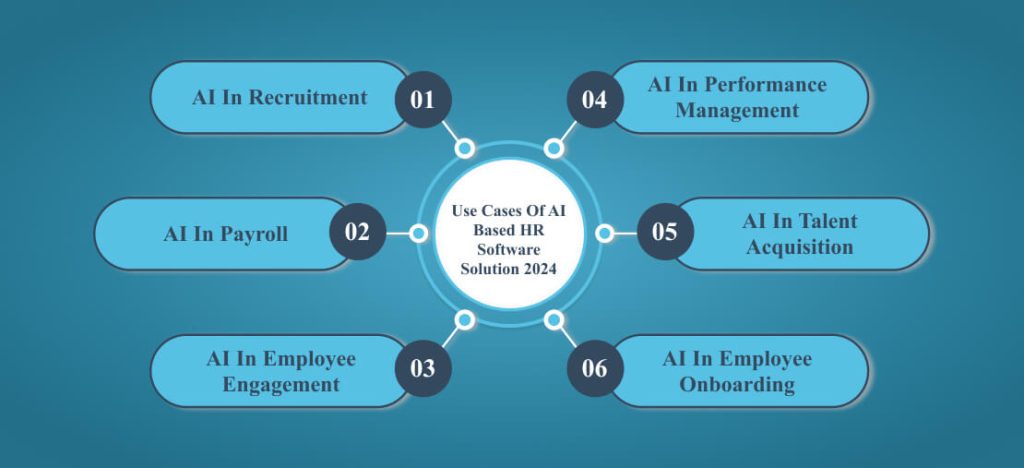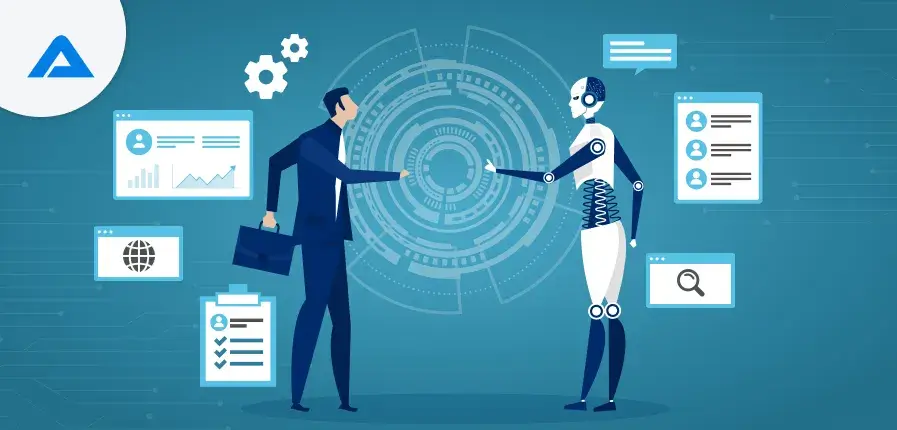Today’s workplace is constantly changing, and there is the integration of cutting-edge technology and the development of flexible work cultures to adapt to the ever-changing demands. HR departments are in constant flux. The Human Resources (HR) department has to stay up with technological advancements and new business challenges. The HR department is experiencing a paradigm shift that is triggered by technology-driven innovation.
Most HR professionals feel a sense of urgency in using AI-based HR software solution. 38% of HR managers have considered or implemented AI methods to increase the efficiency of their organizations. Implementing generative AI within HR is one of the most significant changes expected to transform the HR industry and disrupt traditional notions of work, talent, abilities, and obligations.
Once restricted to administrative tasks and personnel management, HR has risen to the forefront of technological innovation. Generative AI is drastically changing talent acquisition, training, and workplace management.
In today’s post, we examine the impact and future of AI in HR.
Understanding AI In HR Software Solutions
We must first understand the basics of AI Solutions and how it can be applied to HR before considering how it will transform the impact the HR department will experience. AI within HR consists of implementing and using generative AI, an aspect of AI technology. It’s a deep-learning model that can produce high-quality images, texts, and other types of content based on an underlying data source on which the model was developed.
At first, AI’s function within HR was limited to simplifying tasks like sorting through resumes. But as the technology developed, so did its application in HR management. This marked an evolution from performing tasks to improving management decisions and personalizing employee experience.
AI within HR will be projected to create a new model of HR human capital intelligence. It can significantly impact work efficiency, resulting in high productivity and efficiency while reducing operational costs and workplace mistakes. This revolutionary tool will be introduced into the HR department’s system, leading to greater productivity, performance, and effectiveness.
Key Benefits Of AI In HR

The use of AI in HR has numerous benefits, and this list is likely to grow as AI technology improves.
Streamlined Recruiting And Screening Processes
AI to screen and recruit is an effective device for today’s hiring teams. Software development for content generation that helps create the job description and send emails and letters of offer for every position at record-breaking speed. The ability to source candidates will aid in building a skilled workforce quickly. Chatbots designed for careers help potential candidates locate job openings that match their qualifications and expertise.
While it is essential to adhere to AI to follow HR’s good practices and avoid employing AI when deciding whom to employ, AI can speed the process. It can quickly locate qualified applicants from the databases of thousands, perhaps billions, of potential candidates.
Enhanced Performance Reviews And Feedback
Effectively delivering performance reviews and positive feedback to employees is the top goal for businesses nowadays. AI is an emerging force that is changing the conventional approach to managing performance and has brought HR to the age of informed decision-making based on data. AI is helping businesses provide better feedback, lessen review bias, and promote continuous improvement among employees.
AI can give managers the information needed for more detailed, relevant, objective reviews and feedback. When you analyze performance metrics such as project results, collaboration patterns, and personal contributions, AI gives you a greater understanding of how employees’ performance has improved. Based on this information, your comments will be more reliable, helpful, and valuable for your employees.
Remove Bias
AI in HR can help to make data-based decision-making essential to hiring, performance management, and leadership planning. HR must be aware that the personal background of a person applying for the job does not influence decision-making regarding hiring or the progression of career for employees.
Artificial intelligence in staffing solutions allows for an impartial choice of candidates through all kinds of selection processes. The human resource department must provide uniform treatment for everyone in the company at every level. The right decisions are crucial in creating an inclusive environment and ensuring that employees are happy and rewarded for their work.
Employee Satisfaction
Through artificial intelligence, it is possible to offer your employees a personal experience. They can get their questions answered quicker thanks to an artificial intelligence-powered chatbot. The employees don’t need to sit in line for appointments with HR or wait for an answer to simple queries via email.
Additionally, employees are provided with a customized onboarding process and training tips. AI and HR tools assist employees with their career development, further improving their experiences, which results in the satisfaction of employees and their engagement.
Personalized Onboarding Experiences
Onboarding can be a crucial element of the employee’s experience. It will determine whether an employee sticks in the same place or seeks an immediate job. AI-powered onboarding procedures will impress the new employees you hire and make the process more efficient than ever. There’s no question why nearly two-thirds of companies are making use of AI to help onboarding. AI lets your employees provide a personalized onboarding experience to employees to every new employee.

Ready to revolutionize your HR processes with the transformative power of generative Al?

Pooja Upadhyay
Director Of People Operations & Client Relations
Reduced Costs
AI based HR software solution can reduce the time spent on manual record-keeping or documents. Furthermore, the HRMS software will provide accurate information and calculations, saving your company additional costs in correcting tasks like payroll or performance management. Additionally, less need for manual processing and corrections can reduce your expenses.
Better Efficiency
Businesses that use AI for HR technology can improve the efficiency of their human resources department. AI can automate the most tedious jobs, like attendance and managing leave, and also eliminate paperwork. HR has accurate information as the involvement of humans is decreased, and the error rate is reduced.
Real-Time Service Delivery
The use of AI-based HR tools aids employees and HR managers in managing their work in real-time. Utilizing these instruments, HR professionals can efficiently plan the different HR management tasks and make plans for strategic management, thus making the work environment more efficient and resulting in smooth functioning.
Informed Decisions
AI-powered tools within HR assist you in keeping the data in an efficient central database. The data is accessible quickly by HR personnel and other employees whenever needed. The availability of accurate data can help you make decisions based on the facts and avoid misunderstandings or biased decisions. Simple analytics help you make effective and profitable decisions.
Use Cases Of AI Based HR Software Solution 2024

Artificial intelligence is a powerful tool for improving HR efficiency. Employers who use AI for HR will increase productivity substantially. In addition, adjusting to technological advances like machine learning and predictive analytics in the early stages using AI will help companies gain a competitive edge in the marketplace and take significant cost-effective measures.
AI In Recruitment
The HR systems constantly look to incorporate AI into the recruitment process. AI will help streamline the process and provide greater performance. This process begins by posting a job ad before transferring the new employee. It is essential to ensure that organizations are productive and expand their business.
AI is a great tool for reviewing resumes so that HR specialists don’t have to go through each candidate’s application to narrow down the eligible candidates. HR departments may also opt to use AI to schedule interviews. AI can inform candidates about the latest information.
AI In Payroll
The majority of companies utilize AI for HR technology to aid in the processing of payroll using automation. Since payroll processing is among the most time-consuming and complex processes that businesses must perform, employing AI to process payroll processing can greatly improve payroll efficiency. It’s an extremely time-consuming and complex process done manually, which means the possibility of errors and more work time. Additionally, there’s additional time to be spent repairing the errors.
Utilizing AI-powered software to streamline the process allows it to automatically track and retrieve pertinent information from suitable systems, like attendance management. Also, it validates the data by establishing pre-defined criteria to ensure that the human resources department does not need to go through the data repeatedly, saving lots of time and energy.
AI In Employee Engagement
The level of engagement among employees can significantly affect company productivity. The more engaged employees are, the higher the output. That’s why companies are currently investigating employing AI to increase employee satisfaction.
Many organizations depend on surveys to determine the degree of involvement. They are usually monotonous and do not reveal the situation because of limited options. Furthermore, a lot of time is lost between the release of surveys and gathering data, which often leaves it too long before you can determine the data. Although AI may be extremely sophisticated in determining the degree of engagement that an employee is experiencing at work. HR managers can use natural speech processing, such as chatbots, to measure employee motivation.
AI In Performance Management
Performance management is an essential procedure in every organization. It must be conducted every few months and be impartial to be effective. Unfortunately, most organizations only conduct periodic reviews every year that do not provide the full picture.
Because humans are vulnerable to the “Halo Effect” or the “Recency Bias review,” the results are typically heavily influenced by recent events or the individual’s initial impression. In addition, the majority of companies send the reviews out as an official matter, and their employees are expected to respond in the same way, which makes the process ineffective.
Using artificial intelligence in human resources to manage performance could be revolutionary in providing the fairest evaluation to employees. Machine learning within AI instruments allows for tracking employee performance across the years to give an impartial and instant assessment. AI will help HR find employees likely to quit the business and employees with outstanding potential, which could benefit HR for succession planning within the industry.
AI In Talent Acquisition
Recruitment of new talent is among the toughest tasks for HR department employees. AI can determine the company’s future needs and narrow down the applicants it can receive. Artificial intelligence can also be employed to perform primary screening by asking questions and collecting information on candidates’ skills, education, and experience. Furthermore, AI is a way for the business to keep in touch with prospective candidates for employment.
AI In Employee Onboarding
The onboarding process is crucial to employees’ experience as it is among the primary impressions an employee takes with them throughout the duration. AI can be used to communicate various rules for employees, including specific job descriptions and timetables for training.
Additionally, AI can be employed to communicate relevant information about candidates with coworkers and share the details of the team for the new employee. In this way, AI in HR streamlines the onboarding process and eliminates a lot of paperwork by allowing employees to upload documents.

Common Myths About AI In HR
Before you can begin exploring the real-world application of AI for HR, as an HRMS software development company we find it crucial to clear up some of the beliefs about the implementation of AI:
AI Can Replace HR Specialists
Contrary to what many people believe, AI is not poised to take over HR specialists. Present AI technology isn’t autonomous but rather a scaling intelligence. That means every step automated or enhanced by AI requires at least a few humans to remain in the loop to oversee its activities and provide data for accuracy and quality.
Furthermore, many HR-related tasks include strategy planning, relationship management, and ensuring that HR practices are ethical. Procedures. An HR professional’s capacity to comprehend psychological aspects that affect workplace diversity and ensure data security, communicate, connect to workers on a personal scale, and oversee the performance of AI systems can’t be entirely replicated by AI.
AI Decision-Making Is The Equivalent Of a Black Box
A few AI algorithms can be a bit opaque; however, many (e.g., linear regressions or decision trees) are more palatable. By analyzing the broader circumstances of the proposed usage case, including how easily explainable bad or good choices will have to be, the most appropriate AI algorithms can be selected for an application with a proper level of understanding.
The security Of Employee Data Is In Danger With AI
AI is ultimately only software. Firms with solid cybersecurity and Third-party management software already have the systems in place to handle threats to the security of employees’ data. An instance that is believed to have been causing concern recently is SaaS providers creating AI models with aggregated, anonymized data of employees from their customer base.
But this isn’t something new—SaaS companies have been using an aggregated database of employees for many years to analyze their services’ performance and make adjustments—but the recent attention on the issue of AI models is not the right one.
AI Use Cases To Succeed Chances Are Low
The success of AI implementation is independent of the number of usage cases but more on their performance and compatibility with organizational goals. Successfully implementing AI technology will be a huge undertaking and require substantial investments (both for implementation and tracking it regularly). Making a difference with just two to three different use cases can be a significant success for most companies.
It’s Possible To Use AI To Be Impartial
Every AI-driven HR systems creates bad output from time to time. However, when the bad outputs are concentrated in a specific segment of the population that uses it, this is known as bias. Every model has bias at some level. If it doesn’t have one, you don’t know it yet.
It’s crucial to recognize which types of biases are most concerned about and continuously look out for these. There’s no need to worry whether “bad outputs” concentrate on individuals whose names begin with “P.” Still, you might be concerned if “bad outputs” focus only on younger or older individuals using the AI system.
Future Of AI In HR
The future for AI in HR will not only offer significant potential but also transform the industry. As AI continues to alter how HR professionals work, they must develop innovative skills that will remain relevant and create value for business. These are the most important roles that HR professionals must perform and their implications for the profession of HR.
Future developments will change the job of HR professionals. Since AI eliminates the majority of routine, repetitive work that HR professionals do, HR will shift its focus to assisting in the implementation of AI within the entire organization and providing strategic value for the company. HR professionals need to learn new techniques to adjust to this new paradigm.
AI will not only be commonplace throughout the entire employee lifecycle and beyond but will also become an element of the workforce HR has to oversee. Today, the workforce comprises traditional employees and gig workers, contractors, or vendors who perform the tasks. The future will see HR be able to oversee co-bots that work alongside employees to complete the job. In the near future, artificial intelligence can assume full responsibility for specific activities and tasks. This could impact the work process and how HR creates capacity planning for the next time.
Let’s Wrap Up
The application of AI in HR is rapidly increasing. AI can be used as a solution in almost every aspect of HR. In order to fully reap the benefits of AI technology and increase the use of AI in the workplace, HR professionals will have to improve their abilities and implement best practices in using AI.
Some employees may find it scary and intimidating to face radical changes, so HR personnel must be ready to guide employees in navigating the complexities. In the end, employers should identify the most effective methods that have assisted other companies and determine which ones can be used to achieve specific long-term or short-term goals. Tell your employees and the others in your business of the results you have observed. Showing that your HR practices are innovative and up-to-date is essential.

Manage your entire HR function with one single HRMS platform.

Pooja Upadhyay
Director Of People Operations & Client Relations


